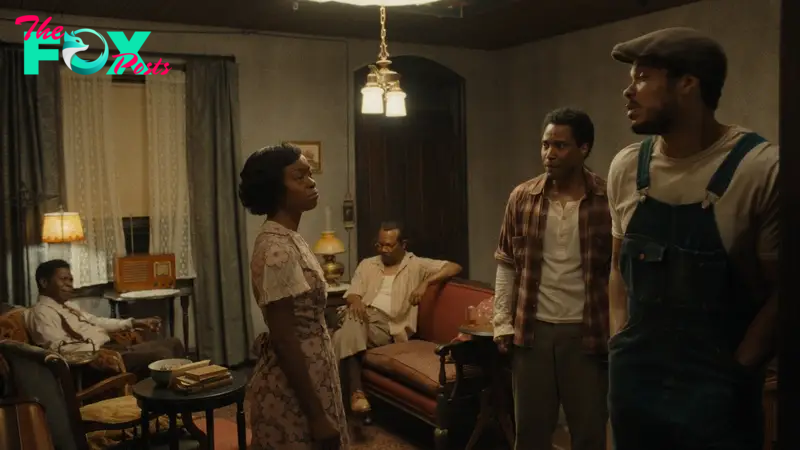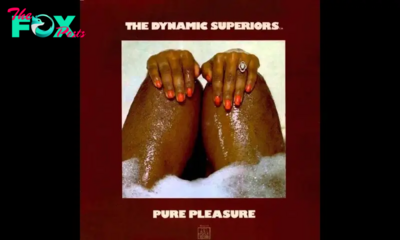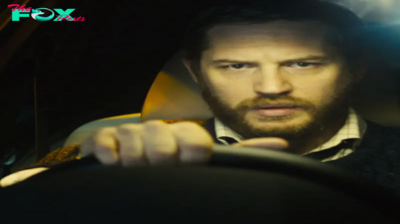Entertainment
Danielle Deadwyler Is The Piano Lesson‘s Guiding Light
Objects have extraordinary power when they’ve been cherished and touched by human hands. That’s the underlying conceit of August Wilson’s play The Piano Lesson, in which a piano passed down through generations of one Black family wields the power to unite that family, though it also threatens to drive them apart. Wilson’s 1987 play, the fourth work in his Pittsburgh Cycle, is now a movie directed by Malcolm Washington (son of Denzel, who is one of the film’s producers) and starring John David Washington (another son of Denzel). That’s a lot of Washington family energy in one film, but the movie’s true anchor is a performer outside that circle of father and sons. Danielle Deadwyler lights the way through this version of The Piano Lesson; her performance is forged largely from fire and iron, but she has moments of melting vulnerability, too. The film’s rhythms occasionally falter—this is Malcolm Washington’s feature debut, and it's an ambitious project for a beginner. But the inherent strength of the material always shines through, largely thanks to Deadwyler. She makes every scene electric, even when she’s not onscreen: her mere presence has the crackle of lightning, a vitality you can feel as much as see.
In this intricate story about intergenerational trauma and lasting scars, set in 1936, John David Washington plays Boy Willie Charles, a wayward man who’s trying to make his mark on the world by buying a very particular parcel of land. His forebears used to be owned by a family called Sutter; now he has a chance to purchase some Sutter land for himself, but he doesn’t quite have enough money to do it. So he Travels from Mississippi to Pittsburgh to the home of his uncle, Doaker (Samuel L. Jackson), where his sister, Berniece (Danielle Deadwyler), also lives. Berniece is the guardian of a very special piano that has been in the family for years: Boy Willie wants to sell it so he can buy that land, but Berniece will not be persuaded. The battle of wills between them is the tinder box that sets the drama of The Piano Lesson ablaze.

The inanimate object at the center of this drama had been lovingly carved with images of Willie and Berniece’s forebears, as well as with meaningful scenes from the family’s History. The piano had been in the Sutter family’s possession for decades; in 1911, it was stolen by Berneice and Boy Willie’s father, who was then killed in retaliation. Willie thinks he has every right to seize and sell the piano, and he doesn’t so much try to win Berniece over as bully her into compliance. Doaker stands in the middle: he keeps insisting Berniece will never relinquish this adored object, though she hasn’t touched its keys in years.
The rich swirl of characters around Berniece and Boy Willie include Berniece’s young daughter Maretha (Skylar Aleece Smith): her husband, Crawley, died years ago, and Berniece blames Boy Willie for his death, another stress point between them. Boy Willie has Traveled from the south with a friend, sweet, simple-minded Lymon (Ray Fisher), who helps Berniece reclaim some of the tenderness she’s been missing since her husband’s death. And there’s another barely glimpsed yet all-important character in this drama, a ghost connected with the Charles family’s past: they won’t be at peace until he’s banished.
There’s a lot going on in The Piano Lesson, and it’s occasionally challenging to keep track of the story’s multiple strands. But by keeping Deadwyler’s face in sight, you can never lose your way. In the film’s chilly climax, she finally sits down at that piano and draws almost inhuman strength from its keys. But Berniece isn’t just a repository for her ancestors’ suffering—she’s also a vessel for their perseverance and their joy. In the film’s final moments, you see that joy radiating through her like inner sunlight. She leaves us not with a lesson, but with an invitation to live.
-

 Entertainment1h ago
Entertainment1h agoDonna Kelce’s ‘Holiday Touchdown’ Cameo Includes Sweet Easter Egg to Son Travis: ‘Love You Mommy’
-

 Entertainment4h ago
Entertainment4h agoAmerica On CoffeeWe’re simply inviting you to take a timeout into the rhythmic ambiance of our breakfast, brunch and/or espresso alternatives. We’re comfortable everytime you cease by.Shoe Shoe Shine – The Dynamic Superiors
-

 Entertainment10h ago
Entertainment10h ago3 Completely different Kinds of TV Appearing Roles
-

 Entertainment10h ago
Entertainment10h agoAmerica On CoffeeWe’re simply inviting you to take a timeout into the rhythmic ambiance of our breakfast, brunch and/or espresso alternatives. We’re comfortable everytime you cease by.SYRUPING UP YOUR VERY OWN COFFEE FLAVORS
-

 Entertainment10h ago
Entertainment10h agoMeet Ava, the Golden Tiger Cub in Thailand Set to Be the Next Cute Viral Sensation
-

 Entertainment10h ago
Entertainment10h agoBest Tom Hardy Movies that Are Must-Watch
-

 Entertainment15h ago
Entertainment15h agoThe Smithereens with John Hampson – West Herr Riviera Theatre – North Tonawanda, NY – November 20, 2024
-

 Entertainment21h ago
Entertainment21h agoAmerica On CoffeeWe’re simply inviting you to take a timeout into the rhythmic ambiance of our breakfast, brunch and/or espresso alternatives. We’re comfortable everytime you cease by.Vacation Espresso Cocktail
















